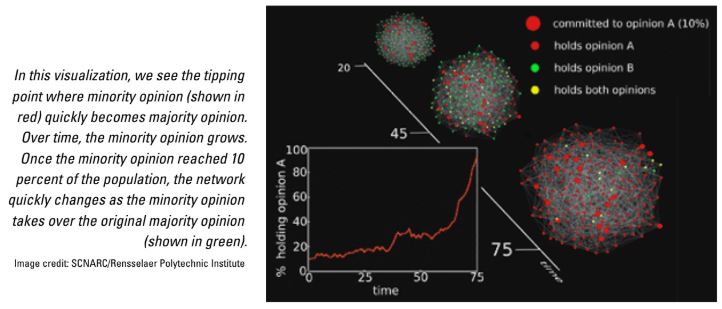
Wiki / Paradigmenwechsel
Inhaltsverzeichnis: (verbergen)
| |||||||||||||||||||||||||||||||||||||||||||||||||||||||||||||||||||||||||||||||||||||||||
| Siehe auch: ► Bewusstsein-Tabellen |
|
| Referenz: ► Artikel Paradigmenwechsel – vom Drückermodus in den Attraktionsmodus, präsentiert von der Plattform für Schreibende Publikum, Elfriede Ammann, 17. Oktober 2020 |
| See also: ► Current trend – Shifting from PUSH mode to PULL mode |
| ||||||||||||||||||||||||||||||||
| See also: ► Stufenmodelle und ► Tao und westlicher Dualismus |
|
Der anstehende Paradigmenwechsel auf politischer Ebene ist ein Sprung vom Nationalstaat zur Weltregierung.
| |||||||||||||||||||||||||||||||||||||||||||||||||||||||||||||||||||||||||||||||||
| Quelle (engl.): ► Interview mit ⚡ Ken Wilber (*1949) US-amerikanischer mystischer Philosoph, Vordenker des 3. Jahrtausends, transpersonaler Bewusstseinsforscher, Entwickler der Integralen Theorie, Autor, präsentiert von Shambhala.com, Teil III, ohne Datumsangabe |
| Siehe auch: ► Ken Wilber und ► Politik |
| See also: ► Passage from force driven controlling ego → self → power dwelling Self |
|
| Quelle (engl.): ► Videopodiumsdiskussion mit ⚡ Ken Wilber (*1949) US-amerikanischer mystischer Philosoph, Vordenker des 3. Jahrtausends, transpersonaler Bewusstseinsforscher, Entwickler der Integralen Theorie, Autor, Interpreting the Singularity, YouTube Film, Minute 10:49, 12:29 Minuten Dauer, eingestellt 13. Februar 2008 |
Persönliche Bekenntnisse
Aufruf
Öffentlicher Appell

Empfehlung
Voraussetzungen für den Fortbestand der Menschheit
Prophezeiungen
Schlussfolgerungen
Einsichten
Überliefert von Carl Gustav Jung zum Thema Paradigmenwechsel
|
Gedichte
| Quelle: ► Gedicht von Novalis [Georg Philipp Friedrich Freiherr von Hardenberg] (1772-1801) deutscher Philosoph der frühen deutschen Romantik, Dichter, Schriftsteller, 1802, Paul Kluckhohn, Herausgeber, Richard H. Samuel, Herausgeber, Schriften (Historisch-kritische Ausgabe), Band 1: "Das dichterische Werk", S. 344, Kohlhammer, Stuttgart, 2. erweiterte und verbesserte Auflage 1960 |
| Referenz: de.Wikipedia-Eintrag ► Wenn nicht mehr Zahlen und Figuren |
| Siehe auch: ► Gedichte und ► Nummerologie und ► Freiheit und ► Spiel und ► Geheimnis und ► Kosmologie |
Personal avowals
Conclusive encouragement
Appeals
Myss' insight after having returned home from a trip to the south of Germany and Austria
Recommendations
Arundhati Roy (*1961) Indian political activist, essayist, novelist, War Talk, South End Press, 1st edition 1. April 2003
Requirements for human continuance
Conclusions
Future prospects

Insight


|
Outcrops of transition: Violent repression of shame ⇔ self-disparaging shame, angry projections
|

Three internet pillars: communication, energy, and transportation
|
Transitioning eras
The Art of the Impossible. Politics as Morality in Practice, Knopf, 1st edition 20. May 1997
|
Travelling memes: 10% of the committed opinion holders change the tide. When 10% of the population holds an unshakable belief, it will always be adopted by the majority of the society.
See also: Article Social consensus through the influence of committed minorities, presented by the US American peer-reviewed scientific journal Physical Review, 22. July 2011

| ||||||||||||||||||||||||||||||||||||||||||||||||||||||
|
Literary quotes
|
| Sources featuring John Hagel III, US American consultant, co-chairman of the Deloitte Center for the Edge, speaker and author on the intersection of business strategy and information technology ► Article John Seely Brown, coauthor, Six Fundamental Shifts in the Way We Work, presented by the bimonthly management magazine Harvard Business Review (HBR), published by Harvard Business Publishing, 17. August 2010 ► Article John Seely Brown, Lang Davison, The Power of Pull. How Small Moves, Smartly Made, Can Set Big Things in Motion, Basic Books, April 2010, 2nd Trade Paper edition 4. December 2012 ► Video presentation Power of Pull, presented by TEDxBayArea, YouTube film, 23:05 minutes duration, posted 19. August 2010 |
| References: ► Book Adam Hartung (*1957) US American entrepreneur, executive in three Fortune 100 companies, business consultant, speaker, columnist, author, Create Marketplace Disruption. How to Stay Ahead of the Competition, FT Press, 1st edition 7. August 2008 ► Book Valerie M. Hudson, Ph.D., US American professor of political science, The Bush School of Government and Public Service, Texas A&M University, since January 2012, Bonnie Ballif-Spanvill, Mary Caprioli, Chad F. Emmett, Sex and World Peace, Columbia University Press, 17. April 2012 ► Article Push to Pull, presented by THNK, Karim Benammar, Menno van Dijk, Bas Verhart, 2. September 2016 |
| Siehe auch: ► Umorientierung aus dem Drückermodus in den Anziehungsmodus |
Keynote adress University of Idaho Women's Center 40th Anniversary Celebration – Gloria Steinem Keynote Adress, sponsored by the University of Idaho Women's Center 40th Anniversary Celebration, Moscow, Idaho, 4. October 2012, YouTube film, minute 14:16, 1:32:13 duration, posted 5. October 2012
Woman on Campus: Gloria Steinem's Day on Campus, Simmons College, 22. March 2013, YouTube film, minute 1:58, 3:44 minutes duration, posted 5. April 2013
|
| |||||||||||||||||||||||||||||||||||||||||||||||||||
| See also: ► Incomplete timetable of paradigmal shifts and ► Evolution and ► History |
|
|
|
|
Excerpts from Malcolm Gladwell, CM (*1963) Canadian historian, sociologist, civil engineering professor emeritus, University of Waterloo, Ontario, Canada, business consultant, speaker, journalist, staff writer at The New Yorker magazine since 1996, author, The Tipping Point. How Little Things Make a Big Difference, Back Bay Books, 7. January 2000

Gathering empirical quality ('sticky') data about ideas (theory or assumption can be debunked)
The Hutterites, Amish or Mennonites have a rule that when a colony approaches 150, they split into two and start a new one.
The Military generally split companies at size 150-200.
The company Gore (Goretex) obeys a staff rule: ~150 employees per plant.
Predictability ⇔ novelty
The rule of 15011 – the ability to handle the complexities of social groups.
| Source: ► Full audiobook narrated by the originator Malcolm Gladwell, CM (*1963) Canadian historian, sociologist, civil engineering professor emeritus, University of Waterloo, Ontario, Canada, business consultant, speaker, journalist, staff writer at The New Yorker magazine since 1996, author, Malcolm Gladwell – The Tipping Point Audiobook, YouTube film, 3:04:32 duration, posted 22. September 2018 Gladwell defines a tipping point as the moment of critical mass, the threshold, explaining three rules (agents of change) of epidemics in the tipping points of epidemics: 1. Messenger – WHO – Law of the few multiplicating key people (connectors ◊ mavens ◊ salespeople) ❄ 2. Message – WHAT – Stickyness/impact factor ❄ 3. Messageability – HOW – Power of context/preparedness (disappointment ◊ enthusiasm ◊ disillusionment ◊ recommendation) |
|
|
|
|
|
| ||||||||||||||||||||||||||||||
| Source: ► Article Davos: Mindfulness, Hotspots, and Sleepwalkers, presented by the US American liberal-oriented online newspaper HuffPost, Otto Scharmer ottoscharmer.com (*1961) German American senior lecturer, Massachusetts Institute of Technology (MIT), founding chair of the Presencing Institute, core faculty member of the U.N. leaders program, 26. January 2014, updated 28. March 2014 |
Struggling with the problematic notion of "commodities"
|
| Source: ► Video presentation by Penny Kelly, US American engineer, kundalini awakened psychic, science translator, teacher, lecturer, spiritual consultant, naturopathic physician, author, New Earth#19: A New Paradigm? The 12 Spheres of Influence, presented by the YouTube platform Penny Kelly, YouTube film, 31:39 minutes duration, posted 20. March 2021 |
|
A Native American tale
In a hidden cave an old woman is weaving a garment up to the trim. Bitten and chewed on porcupine quills are to hold the hem. She removes into the back of the cave to the ever burning fire to stir the seeds of life in the cauldron above the fire.
Meanwhile the black dog in the cave unravels the entire garment which was the result of the work of eons.
The beautiful new design had become necessary because the black dog
We are living in the black dog times,[*] in the times of unraveling – and we can choose to weave the loose threads again – back into the world. We are invited to reweave ourselves and the world – by the wise one in us. |
| Source: ► Audio interview with Michael Meade, US American storyteller, mythologist, author of the book The world behind the world. Living at the ends of time, Mythic storytelling and the ends of time, presented by the US American web radio station New Dimensions, program #3243, host Michael Toms, minute 28:35-32:55, aired 25. February 2008 |
| See also: ► Stories ► [*] Pluto in Capricorn – Rise and fall of empires – Structural transformation ► Current trend – Shifting from PUSH mode to PULL mode |
|
Today we mourn the passing of a beloved old friend, Common Sense, who has been with us for many years. No one knows for sure how old he was, since his birth records were long ago lost in bureaucratic red tape. He will be remembered as having cultivated such valuable lessons as: ⚑ Knowing when to come in out of the rain;
⚑ Why the early bird gets the worm;
⚑ Life isn't always fair;
⚑ And maybe it was my fault.

Common Sense was preceded in death, ⚑ by his parents, Truth and Trust,
⚑ by his wife, Discretion,
⚑ by his daughter, Responsibility,
⚑ and by his son, Reason.
He is survived by his 5 stepbrothers: ⚑ I Know My Rights,
⚑ I Want It Now,
⚑ Someone Else Is To Blame,
⚑ I'm A Victim,
⚑ Pay me for Doing Nothing.
Not many attended his funeral because so few realized he was gone. |
| Source: ► Gloss An Obituary printed in the London Times, presented by the portal clubrunner.ca, 10. August 2008 |
|
|
| Source: ► Anne Hillman, US American organizational development consultant, musician, inspirational author, Life Prayer, 2014-2015 |
| See also: ► Prayers |
Links zum Thema Paradigmenwechsel / Paradigm shiftLiteratur
Der Prozess, bis der Tipping Point (die kritische Masse) erreicht wird, umfasst vier Phasen:
Literature (engl.)
Expanding the traditional view of yin and yang to a four-dimensional model. Haddon offers a yin feminine and a yang feminine and
Within the societal structure of the power/dominator system there were five stages of human consciousness correlating with
Externe Weblinks
Rifkin verkündet den Niedergang des Kapitalismus und den Beginn einer sozialen Gemeinschaft.
1. Trauma und Freier Wille Weblinks zum Thema Paradigmenwechsel – QuoraBeiträge verfasst von Elfriede Ammann, präsentiert auf der kalifornischen Frage-und-Antwort Webseite Quora DE
External web links (engl.)
Linkless article
Audio- und Videolinks
Veranschaulichung der Bewusstseins- und Entwicklungsstufen von Spiral Dynamics
Weltuntergang, Apokalypse, Armageddon: Eine philosophische Betrachtung der Endzeit – und Endzeitvorstellungen
Linklose Medienangebote
Von den isolierten Teilchen der klassischen Physik, über den Wellencharakter der Atome bis zur Vorstellung eines Feldes
Audio and video links (engl.)
New paradigm for civilization, philosophy, politics resting on the four pillars of 1. decentralisation, 2. democratisation, 3. education, and 4. sustainability
The great challenge of our time is to build and nurture sustainable communities, designed in such a manner that their ways of life, physical structures, and technologies do not interfere with nature's inherent ability to sustain life.
Audio and video links (engl.) – John Hagel
|
Englisch Wiki
Hawkins
1 Siehe: Die zwei Versionen der Darwinschen Evolutionstheorie – David Loye ⇑
2 Siehe: Die zwei Versionen der Darwinschen Evolutionstheorie – David Loye ⇑
3 Domination system ⇔ partnership system – Riane Eisler ⇑
4 Boleslaw K. Szymanski, J. Xie, S. Sreenivasan, G. Korniss, W. Zhang, C. Lim, Social consensus through the influence of committed minorities, presented by Physical Review, E84, 22. July 2011 ⇑
5 Article Government Agency Warns Global Oil Industry Is on the Brink of a Meltdown, presented by the Canadian-American print magazine Vice, Dr. Nafeez Ahmed (*1978) British investigative academic, editor, journalist, author, 4. February 2020 ⇑
6 Domination system ⇔ partnership system – Riane Eisler ⇑
7 "Push" mode: Reliance on elite decision makers, decisions and processes tend to follow linear, hierarchical top-down/bottom-up schema
"Pull" mode: defused, decentralized basis for decisions and organizational involvement, decisions and processes result from spontaneous self-organization and social action learning conducted by individuals who proactively participate in learning communities, ability to draw out people and resources as needed to address opportunities and challenges ⇑
8 The Great Re-convergence – Balancing Westerners and Resterners ⇑
10 Catch phrase of the ethic humanist philosophy Ubuntu [Bantu word]: "I am what I am because of who we all are." This definition was offered by Liberian peace activist Leymah Gbowee. ⇑
11 Dunbar's number ⇑
12 Joseph Smith was a deceiver, polygamist, and cult leader. ⇑
13 Note: Mandela has been a terrorist jailed for murder. ⇑